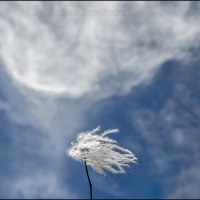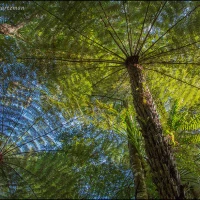Posts Tagged ‘waterfall’
Two takes on the main Smith Memorial Trail waterfall
On April 21st, after we had several inches of rain overnight, I made the rounds of some local waterfalls, one of which you’ve already seen. Now here’s the main waterfall that the Smith Memorial Trail lets a person visit along Bull Creek. I started out with tight shots of that waterfall, as shown below. Then I realized there was much to be gained by doing vertical takes that included a lot more of the churning water flowing down the creek at the base of the waterfall; in fact the turbulent water became the primary subject, with the falls playing a supporting role. From one such picture to the next, the configuration of the quickly moving water varied a lot. I particularly like this one for the swirl in the foreground.
© 2023 Steven Schwartzman
Came the rain
Several inches of rain finally came our way on the evening of April 20th. The next morning I went out to take photographic advantage of a replenished Bull Creek. As I’ve done many times before, I experimented with slow shutter speeds like the 1/8 of a second I used in the top picture of a waterfall, and fast shutter speeds like the 1/2500 of a second I used in the bottom picture. The compositions don’t match exactly but I think you’ll have no trouble telling it’s the same waterfall despite the very varied effects of such different shutter speeds. Some of you may prefer “silky” water while others may go for water that looks like ice.
© 2023 Steven Schwartzman
Devil’s Waterhole
On January 26th we spent some time at Inks Lake State Park, located about an hour west of Austin. The damming of the Colorado River has deepened and widened a portion of Valley Spring Creek to create what people call the Devil’s Waterhole, as you’re seeing above. Further upstream is the small waterfall shown below. Both views reveal how attractive the bedrock and boulders are in that part of central Texas.

✦
✦ ✦ ✦
✦
The University of Central Florida has adopted radical Diversity, Equity, and Inclusion (DEI) programming that segregates students by race, condemns the United States as “white-supremacist culture,” and encourages active discrimination against the “oppressor” class, characterized as “male, White, heterosexual, able-bodied, and Christian.”
Officially, UCF reports that it has 14 separate DEI programs, costing in the aggregate more than $4 million per year. But this dramatically understates the reality, which is that the ideology of “diversity, equity, and inclusion” has been entrenched everywhere. The university’s administration and academic departments have created a blizzard of programs, classes, trainings, reports, committees, certifications, events, documents, policies, clubs, groups, conferences, and statements pledging UCF to left-wing racialism.
So begins Christopher Rufo’s February 15th City Journal article “Racism in the Name of “Anti-Racism.” Of course segregating people and programs by race is blatantly illegal, but the attitude of “anti-racist” racists could be summed up as: the 14th Amendment and the 1964 Civil Rights Act and human decency be damned.
As the article explains, Rufo and some of his colleagues have proposed doing away with racialized bureaucracies and programs in Florida’s universities. You can read about that in the document titled “Abolish DEI Bureaucracies and Restore Colorblind Equality in Public Universities.”
© 2023 Steven Schwartzman
Small waterfall abstraction
On May 25th I stood over a small waterfall in a tributary to Bull Creek, aimed straight down, and did abstract takes at slow shutter speeds like the one-quarter of a second that produced today’s portrait. Some people see flows of white hair. I see flows of the imagination.
§
§ § §
§
But supposing that the world has become “filled up,” so to speak, with liberal democracies, such that there exist no tyranny and oppression worthy of the name against which to struggle? Experience suggests that if men cannot struggle on behalf of a just cause because that just cause was victorious in an earlier generation, then they will struggle against the just cause. They will struggle for the sake of struggle. They will struggle, in other words, out of a certain boredom: for they cannot imagine living in a world without struggle. And if the greater part of the world in which they live is characterized by peaceful and prosperous liberal democracy, then they will struggle against that peace and prosperity, and against democracy.
That passage from Francis Fukuyama’s 2006 book The End of History and the Last Man was prescient, given the social upheaval we’ve seen in the past few years and especially since the moral panic of 2020. You may be interested in listening to a one-hour conversation between Francis Fukuyama and Andrew Sullivan from May 27th. Among other things, Fukuyama speaks about what he considers deformations of liberalism on both the political left and right.
© 2022 Steven Schwartzman
Sunlight at the base of a waterfall
Look at how sunlight illuminated the splashing water at the base of a small
waterfall along the Twin Creeks Historic Park Trail in Cedar Park on March 12.
❖
❖ ❖
❖
On television a couple of days ago I heard someone quote Voltaire: “Anyone who can make you believe absurdities can make you commit atrocities.” I wondered whether Voltaire really said or wrote that, so I went searching. On the Cato Institute website I found a 2020 article by Walter Olson called “The Origins of a Warning from Voltaire,” which linked to this passage from Voltaire’s Questions About Miracles (1765):
Il y a eu des gens qui ont dit autrefois : Vous croyez des choses incompréhensibles, contradictoires, impossibles, parce que nous vous l’avons ordonné ; faites donc des choses injustes parce que nous vous l’ordonnons. Ces gens-là raisonnaient à merveille. Certainement qui est en droit de vous rendre absurde est en droit de vous rendre injuste. Si vous n’opposez point aux ordres de croire l’impossible l’intelligence que Dieu a mise dans votre esprit, vous ne devez point opposer aux ordres de malfaire la justice que Dieu a mise dans votre cœur. Une faculté de votre âme étant une fois tyrannisée, toutes les autres facultés doivent l’être également. Et c’est là ce qui a produit tous les crimes religieux dont la terre a été inondée.
Formerly there were people who said: “You believe things that are incomprehensible, contradictory, impossible, because we have commanded you to believe them; now go and do unjust things because we command you to.” Those people show admirable reasoning. Surely whoever can make you be absurd can make you be unjust. If the God‐given understanding of your mind does not resist a demand to believe what is impossible, then you will not resist a demand to do wrong to the God‐given sense of justice in your heart. As soon as one faculty of your soul has been tyrannized, all the other faculties will be tyrannized as well. And that’s what has produced all the crimes of religion which have overrun the world.
So the version I heard on television is a pithier, stronger version of the original. Voltaire was criticizing religion, presumably Christianity. Two and a half centuries later, we can apply his analysis to the secular “woke” religion of our time, in which people are demanding that we believe things as absurd as that men can give birth. More about that next time.
© 2022 Steven Schwartzman
What a difference the speed makes
After Austin got a bunch of rain, I headed over to Bull Creek off Lakewood Dr. on October 14th to see what sorts of pictures I could make of a waterfall there. I took the top photograph at a shutter speed of 1/8 of a second and the bottom one at only 1/1600 of a second. Neither of the images matches what my eyes and brain saw when I was at the waterfall, and that once again raises the question of what is real.
⨳
⨳ ⨳
⨳ ⨳ ⨳
⨳ ⨳
⨳
From reading Jonathan Rauch’s The Constitution of Knowledge, I’ve learned a little about the American philosopher Charles Sanders Peirce [pronounced Purse], who lived from 1839 to 1914. Here’s a relevant passage from Peirce:
— — — — — — — — — — — — — — — — — — — — — — — — — — — — — — — — — — — — —
Upon this first, and in one sense this sole, rule of reason, that in order to learn you must desire to learn, and in so desiring not be satisfied with what you already incline to think, there follows one corollary which itself deserves to be inscribed upon every wall of the city of philosophy:
Do not block the way of inquiry.
— — — — — — — — — — — — — — — — — — — — — — — — — — — — — — — — — — — — —
Alas, in today’s academic world, ideologues are increasingly blocking the way of inquiry by peremptorily declaring certain topics off-limits and attacking anyone who investigates those topics.
© 2021 Steven Schwartzman
More from Yoho National Park and vicinity
Four years ago today we spent some scenic time in and around British Columbia’s Yoho National Park. One highlight was Natural Bridge Falls, with its intriguing rock formations on the Kicking Horse River. Carloads and busloads of tourists swarmed the site, so it took patience and some judicious framing to get pictures without any people in them, like the first one below.
Along the Trans-Canada Highway a little west of Yoho National Park
we saw a bunch of female bighorn sheep, including the one
in the bottom portrait, whose texture and coloring seem
to me now to match those of the rocks in the top picture.
© 2021 Steven Schwartzman
Waterfall Wednesday #5
On June 5th I spent time at Stone Bridge Falls on Bull Creek. Whereas in the photo you saw a week ago I used a very fast shutter speed to stop the action and maximize details, in the picture above I chose the slow speed of 1/8 of a second to smooth out the turbulent water. Below is a closer and therefore more abstract portrait I made at 1/15 of a second; some of the water ended up looking like long gray hair.
◊
◊◊
◊◊◊
“I believe my value lies in the quality of my work, the goodness of my deeds, the essence of my character, and the fullness of my heart, not my skin color.” — Jodi Shaw, 2021.
© 2021 Steven Schwartzman
Waterfall Wednesday #4
On June 5th I spent time at Stone Bridge Falls on Bull Creek. To play up the details in the churning creek below the falls, I chose a shutter speed of 1/3200 of a second. While the resulting image might seem black and white, it does harbor some dark brown in its upper part.
◊
◊◊
◊◊◊
Here’s a passage from Douglas Murray’s thoughtful 2019 book The Madness of Crowds.
Even when it does not identify itself as such, the Marxist and post Marxist trend on the political left can always be recognized by the set of thinkers whom it cites and reveres, and whose theories it tries to apply to any and all disciplines and walks of life. From Michelle Foucault these thinkers absorbed their idea of society not as an infinitely complex system of trust and traditions that have evolved over time, but always in the unforgiving light cast when everything is viewed solely through the prism of ‘power’. Viewing all human interactions in this light distorts rather than clarifies, presenting a dishonest interpretation of our lives. Of course power exists as a force in the world, but so do charity, forgiveness and love. If you were to ask most people what matters in their lives very few would say ‘power’. Not because they haven’t absorbed their Foucault, but because it is perverse to see everything in life through such a monomaniacal lens.
Nevertheless for a certain type of person who is intent on finding blame rather than forgiveness in the world, Foucault helps to explain everything. And what Foucault and his admirers seek to explain in personal relations they also attempt to explain on a grand political level. For them absolutely everything in life is a political choice and a political act.
… And always and everywhere is the aim — taken from French literary theory — to ‘deconstruct’ everything. To ‘deconstruct’ something is as significant in academia as ‘constructing’ things is in the rest of society. Indeed, it is one curiosity of academia in recent decades that it has found almost nothing it does not wish to deconstruct, apart from itself.
© 2021 Steven Schwartzman
























